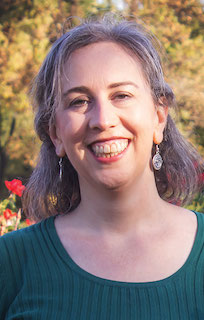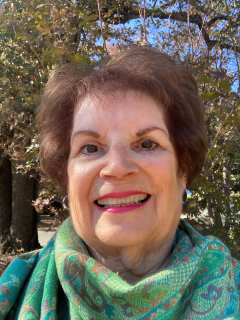-
Teaching and Learning Where Others Might Not Have Chosen
 Written by Michelle J. Goff, Founder and Director of Iron Rose Sister Ministries
Written by Michelle J. Goff, Founder and Director of Iron Rose Sister Ministries“Here am I, send me!” (Is. 6:8)
Stubborn, independent, and strong-willed have described me since early childhood. Facing a challenging character quality in her daughter, my mom remembers hearing a helpful interpretation of “Train up a child in the way he should go…” (Prov. 22:6) during her child-raising years. Instead of the continual frustration of squelching the strong will of four daughters, find out the way each of them should go and point them in a Kingdom direction. Or, “Train up a child in the way SHE should go…” (emphasis added).
If Michelle was going to be stubborn, may she stubbornly cling to God’s Word. If her way was independent, may it be as an independent follower of Christ, especially when those around her were not following Him. If she should continue her strong-willed spirit, may her will align with God’s will and uncompromisingly obey Him.
Stubborn independence can also be used to describe pioneers. Uncharted territory must be discovered by those willing to go where others haven’t or won’t. In missions and in ministry, I have always felt called to go where others were less willing or able to go. When I first felt called into full-time missions, God was leading me to help establish a congregation in north Bogotá.
“Here am I, send me!”
The doors in Colombia were beginning to open as a safer place for North Americans to live, while many still feared the horror stories of kidnappings. North Bogotá was the direction in which the capital city was expanding. Yet there were still many doubts, especially about sending a single woman to serve there.
When I shared with my parents my desire to go and to serve in Colombia, as my Christian brother and sister they affirmed that they honored my desire to answer His call… Who were they to argue with the same God they served? Additionally, my mom said, “As your Christian sister, I support you and am proud of you. But as your mom, Aaaaaaaahhhhhhh! (I’m scared!)”
I appreciated her honesty. And I continued to pray for wisdom in answering that call. God allowed me to hold onto that dream, the seed He had planted. I was able to be a part of the North Bogotá congregation’s first meeting in March 2000, their one-year anniversary in 2001, and continual visits three to four times a year through late 2006.
By early 2000, when I first started visiting Bogotá, I had already been to Venezuela several times, where the political situation was deteriorating (opposite of Colombia where things were growing and strengthening). In 1999, I had also begun work with a new congregation being established in Cozumel, México. Phil and Donna Waldron were the on-the-ground missionaries invested in the work there. I coordinated campaign groups from Harding University and the North Atlanta Church of Christ, where I worked at the time.
There was always a long list of those interested in partnering with the work there in Cozumel. Some of you may remember that it was in Cozumel that I first learned to drive a stick shift because that was the only way to get to a Bible study (story in Ch. 11 of One Single Reason: Conversations with Single Women).
Even though the opportunities in Cozumel grew and I felt qualified to serve there, I felt more called to go where others were less likely to go. Having already achieved a certain mastery level of Spanish, being dark haired with dark eyes, I could blend more easily into the variety of skin colors, even as fair skinned as mine, found in Venezuela and Colombia.
“Here am I, send me!”
The pioneering spirit God gave me as an oldest child, through my innate stubbornness, independence, and strong will, allowed me to answer that call. God used the passion He gave me for languages to develop a very natural Venezuelan accent.
And now, as I strive to learn Portuguese, I wonder how God will equip me, as He did Isaiah, because of a willing spirit to serve. God excels in equipping the called instead of calling the equipped. That way, He gets all the glory.
Iron Rose Sister Ministries began because God revealed a tremendous need, stepping into an area of ministry that no one else was addressing. Women long to be in authentic relationships, but often lack the tools to do so. We exist to equip women to connect to God and to one another more deeply.
I have taught and learned in more diverse contexts that I would’ve ever asked or imagined. But God… I love that phrase! But God, in His infinite wisdom, longs to teach us in places that others may have never chosen to learn. Yet when we meet Him there, when we answer His call, He is waiting to reveal His truths in deeper and broader ways,
Where will you be open to letting God use you to teach or to learn today?
Remember to answer, “Here am I, send me!” -
Why Did Jesus Have to Go Through Samaria?
 Written by Deanna Brooks, volunteer with Iron Rose Sister Ministries in Arkansas
Written by Deanna Brooks, volunteer with Iron Rose Sister Ministries in ArkansasSamaria: the region between Judea in the south and Galilee in the north of the Promised Land. It was the area given to Ephraim and Manasseh, sons of Joseph, when Israel entered the land. Second Kings 17:24-33 gives us background about the Samaritans. After the Assyrians conquered the Northern Kingdom and took most of the Israelite people into captivity, they resettled that land with foreigners. Those people intermarried with the Israelites who were left in the region, creating a mixed race that became known as Samaritans. They were hated by the Jews because even though they worshipped the Lord, pagan gods had been brought in, and they also worshipped those foreign gods. The Samaritans only accepted the first five books of the Old Testament. They chose to worship on Mt Gerizim rather than in Jerusalem. In AD 6, Samaritans desecrated the Jewish temple by putting human bones in the temple porches and sanctuary during Passover.
Despite the hostility Jews felt towards Samaritans, Jesus chose to walk through their land in a time when “Righteous Jews” traveling between Galilee and Judea would avoid going through Samaria by crossing to the eastern side of the Jordan River, adding about three days to the journey.
John 4:4-6 tells us Jesus had to go through Samaria. He stopped in the town of Sychar (Old Testament Shecham) to rest at Jacob’s well. It was about noon, and He was weary. Jesus made at least seven round trips between Jerusalem and Galilee during His ministry, and this is the only time we are told the route He took. Focus on the word “had” in verse 4. The literal Greek translation is “it was necessary.”
Why did Jesus “have to” go through Samaria when other Jews either chose not to go through there at all, or to pass through as quickly as possible? I believe Jesus went because He intended to meet the woman at the well. He knew she would be coming for water. She, however, had no idea what that daily trip to the well would bring.
Throughout the Scriptures, we see how God has pursued mankind. Even though she was not looking for Jesus, He was looking for her. Jesus stopped at the well to rest and His disciples went into town to buy food. While they were gone, the woman came to the well to draw water where she met Jesus. When the disciples returned, they marveled that He was talking to a woman… a Samaritan woman at that, but surprisingly, none of them asked why. Perhaps it was because it was early in Jesus’ ministry, and they were already learning that their Teacher did the unexpected.
In John 4:26 Jesus reveals to the woman that He is the Messiah she is expecting. In verse 28 she leaves her water jug and rushes back into town to share the news that she has found the Messiah, and the whole village comes out to hear Him. As the village people talk to Jesus, they ask Him to stay, and He spends two days with them (verses 40-43).
We learn: Even though we may not be looking for God, He is looking for us.
The time would come when Jesus would tell His disciples to “make disciples of all nations” (Matt. 28:19). His last words before ascending back to the Father were, “You will be my witnesses in Jerusalem, and in all Judea and Samaria, and to the end of the earth” (Acts 1:8). Jesus was preparing them to hear those words by setting an example. He “had to” go through Samaria because He wanted to reach this one woman, and through her, He would reach her whole village… Samaritans… the people who were half Jew and half Gentile… hated and despised.
From this encounter we learn that cultural or racial prejudices must not affect our decision to teach others, and this command often leads down a path we did not plan.
Today, we have our own “Samaritans,” those who, for any number of reasons, are outside our circle of friends or our comfort zone. Are we pursuing them to share the story of Jesus as intently as God has pursued us?
See more photos on our Photo Gallery page.
(c) Iron Rose Sister Ministries. Site setup by Perfect Fit Web Design; Flag icons by Free Flag Icons

